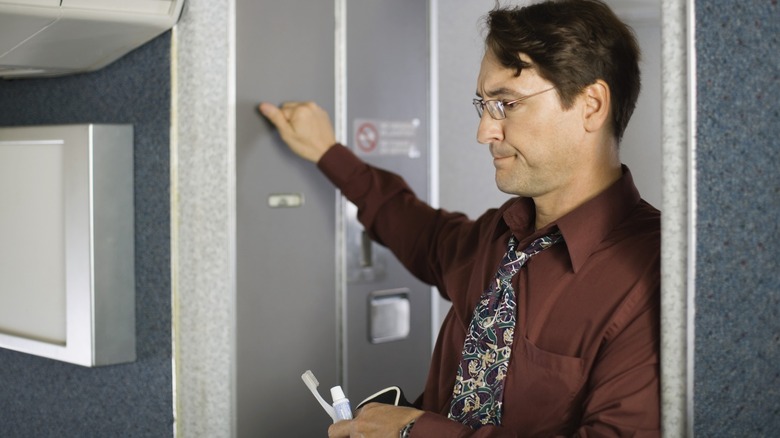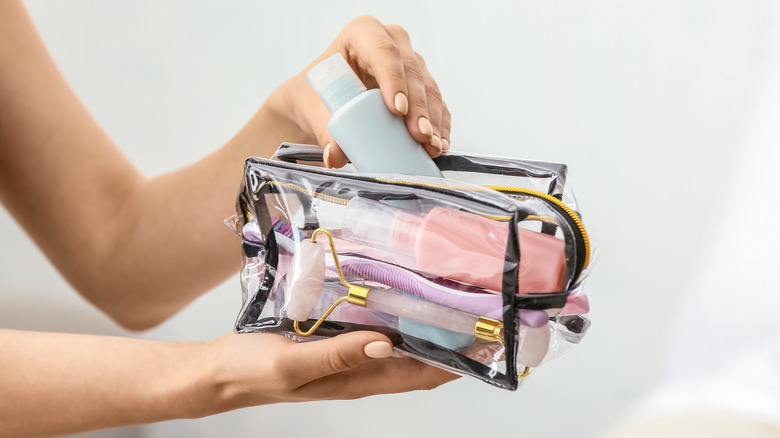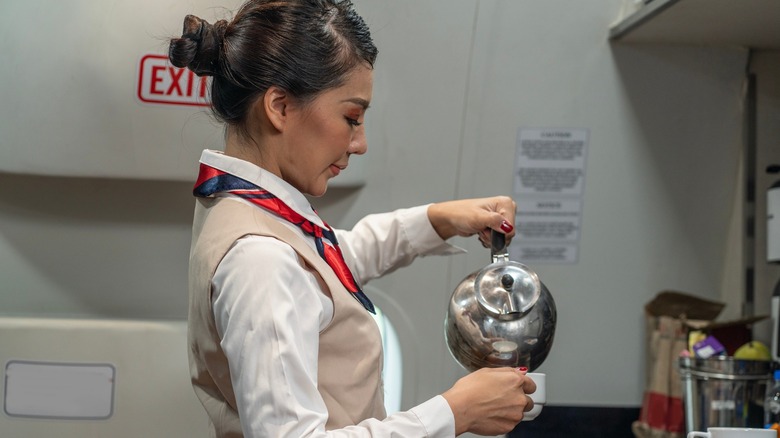The Gross Reason To Avoid Brushing Your Teeth On A Plane
Nobody's breath is pleasant after a day of layovers and airport security lines. Throw in a few coffees, a stop at the airport lounge, and a handful of fast food meals on the go, multiply the whole thing by a redeye, and it's pretty clear why anyone would want to hit the airport lavatory with a toothbrush before landing. But that doesn't mean it's a good idea — in fact, mile-high dental hygiene may be anything but safe if it means brushing teeth with airplane lavatory water. That's because the water that comes from the lavatory tap isn't filtered or fit for human consumption, according to a 2019 study ranking several regional and major airlines on onboard water safety.
Cosponsored by Hunter College NYC Food Policy Center at CUNY and DietDetective.com, the study ranked airlines based on adherence to the federal Aircraft Drinking Water Rule (ADWR). The shocking results included far too many samples that tested positive for E. Coli and Coliform. The top-rated major airlines came in at a 3.3 on a 0 to 5 safety scale, with Spirit and JetBlue tied at 1, coming in last.
The study's authors ultimately concluded that airline passengers should avoid drinking coffee, tea, or any unsealed water while onboard an airplane. They even recommended against using airline lavatory water to wash hands, instead opting for hand sanitizer. And with water that sketchy, the last thing anyone should be doing on a plane is using it to brush their teeth with airplane water.
Handling dental hygiene on a plane
The dodgy, E. Coli-riddled airplane water doesn't necessarily mean you should just skip dental hygiene altogether when you fly. If you're flying internationally or you've just spent the day airport-hopping, you probably need to find some way to clean those pearly whites. The Mayo Clinic recommends brushing at least twice per day and after consuming anything containing sugar, as this creates an environment where bacteria-containing plaque can begin to harm your teeth enamel. They also recommend flossing once per day and following your toothbrushing up with a little mouthwash.
You can try lining up your dental detailing at an airport between flights. But this might not always be possible, and even if it is, you might be too focused on catching your next flight to hop on the Colgate train. To handle your toothbrushing on a plane, bring travel-sized dental products with you and ask the flight attendant for a sealed water bottle to use when you're ready to brush your teeth. Be sure to include a travel-sized mouthwash bottle in your liquids bag for airport security, along with a small hand sanitizer bottle or wipes to use after touching the lavatory door. If you want to travel on the lean side, you can forgo the travel toothbrush for a two-in-one waterless disposable mini-toothbrush like Colgate Wisps.
Be informed but not afraid about airplane water
Even though it's been well established that airplane lavatory water is not potable, not everyone agrees with the CUNY water study's warning against drinking coffee and tea on a plane. In a Reddit post on r/travel diving into the nitty-gritty of the issue, several airline workers insisted that they absolutely use potable water when brewing these staple beverages, while many frequent flyers reported seeing bottled water used to brew them. As u/Groveldog put it, "The flight crew live on tea and coffee made from the aircraft brewers/urns. Haven't had a pilot die in flight from the drinks on any of my flights yet (I'm an FA)."
While a few airline employees insisted that the coffee and tea urns themselves aren't regularly sanitized on every airline, the overall responses on the coffee and tea risk seemed to be fairly mixed. This response from u/welk101 probably offers some of the best advice on in-flight food and beverage service: "I would say if it worries you, give the hot drinks a miss and take your sealed drinks — but be aware that every time you eat or drink anything that isn't sealed on your trip, its probably not much better."


